Darren Sammy’s surprise appointment as West Indies captain appears to mark another ‘fresh start’ for Caribbean cricket
Surprising though the decision may seem to appoint Darren Sammy captain of the West Indies cricket team, the selectors may well have felt that they had little choice. Sammy, the first St. Lucian to earn a place in the West Indies team and now the first to be appointed captain would, in all likelihood, not have been what the Americans call a shoo in for the job. It would have come down, one feels, to a process of elimination. When, for one reason or another, the other possible alternatives would have been ruled out, he would have been the last man standing. This, most assuredly, is not the best way to go about selecting a captain and while the panel of selectors would probably not admit it, the available evidence suggests that they would have been reduced to treating Sammy as the best choice in the circumstances.
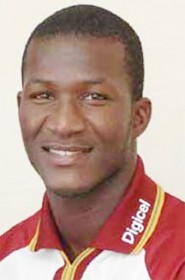
What the decision certainly reflects is that Caribbean cricket continues to be in a protracted process of transition and that the transition has as much to do with issues of team leadership as it does with settling on a crop of players who are sufficiently committed and sufficiently talented to at least make a fist of the job of returning the Caribbean to the upper echelons of international cricket.
Both the issue of finding the right leader and identifying and honing the best collection of talent are fraught with difficulties and both Sammy and his current charges may well end up being just another manifestation of the far from complete transition to which the Board has been alluding. On the other hand, the St Lucian may well, by dint of his oft-demonstrated determination and his promise to bring more “energy” to the team, prove to be the man for the job of leading the revival, though, if the truth be told, the job will almost certainly require a good deal more than his demonstrable passion and commitment.
Turning first to Sammy’s emergence as captain, it would be helpful to examine the presumed process of elimination through which the selectors would have settled on him. Chris Gayle’s removal from the captaincy, though, by his own admission, a disappointment to him, was by no means entirely unexpected. Jamaica had declined to make him captain of their national team for the current regional cricket season and even if, as some have suggested, there was no nexus between that decision and the security of his position as West Indies skipper, the selectors would probably have felt that he had made a less than attractive case for his retention in the position by turning down the Board’s retainer contract offer. Gayle himself had secured the captaincy through a process of attrition. At the time of his appointment he was the most senior member of the team considered for the job,
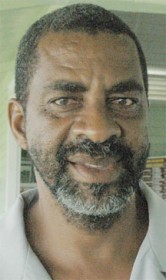
Gayle’s leadership skills have been questioned in one quarter or another throughout the entire period of his captaincy. There were those who thought that his personal demeanor, his laid back physical posture were not consistent with the sense of urgency that needed to be manifested in the leadership of a team in crisis. Apart from that, Gayle never gave the impression of being what one might call an establishment man. He always appeared to play his cricket and make his leadership decisions as he alone saw fit and some of his public pronouncements were certainly not to the liking of the Board. Chris Gayle’s tenure as captain was never really underpinned by that harmony between players and establishment which one might consider desirable (and then again others may not) for Caribbean cricket and perhaps the most important point of all is that he has not, as captain, produced the kind of results on the field that would have made his removal as captain more difficult for the selectors.
Once the selectors had decided that the time had come to relieve Gayle of the captaincy, attention would almost certainly have been turned to Dwayne Bravo. That would have been the case for two reasons. Somehow, you get the feeling that the energetic Trinidadian is one of those people who was born to play cricket. Since his entry into the West Indies team he has performed with a commendable level of competence in every department of the game adding a sense of urgency to the team’s on-field performances that was decidedly absent prior to his selection. Since becoming a ‘regular’ in the Caribbean side Dwayne Bravo has presented himself as the kind of player whose exclusion can be justified in no other circumstance save and except injury. Under Gayle’s captaincy you always got the impression that Bravo was the kind of player who took responsibility and, moreover, that he was part of a small on-field think tank in charge of critical tactical decision-making. Time and again he has proven that in any department of the game he could conjure up some piece of magic, some stellar performance that could make a difference and lift the entire team.
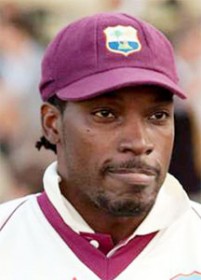
What may have ruled Bravo out was a feeling on the part of the regional cricketing establishment that his commitment to West Indies cricket may have become somewhat diluted by his realization that his particular talents also make him ideally suited to the more lucrative twenty/20 cricketing circuit which has now, it seems, robbed the regional test team of the talents of Keiron Pollard. Bravo himself had made it clear that he is not interested in the WICB’s retainer contract though one might argue that if he was considered good enough and committed enough to part of the tour to Sri Lanka he could surely have been made captain of the team, anyway. Somehow, you get the feeling that twenty/20 or otherwise, Dwayne Bravo would not have turned his back on the West Indies. The selectors, it seems, were not about to take a chance on that.
After that only Sammy remained. In fact, so weak is the state in which West Indies cricket finds itself that to look beyond Sammy would have meant having first to contemplate whether or not there was any other player good enough to hold down a permanent place in the team far less to be considered for the captaincy. Sammy himself, it has to be said, had been, up until the recent South Africa tour to the Caribbean, by no means a regular first team selection. His performances against South Africa would probably have convinced the selectors that he had finally arrived at a point where his name would pencilled in to the final twelve with greater regularity. As for the captaincy it has to be said that it is a surprising – if, in the circumstances – not a shocking elevation. Perhaps little else can be said about the decision than that Darren Sammy found himself, remarkably, in the right place at the right time.
All of his skills, both as a player and as a leader will be challenged and the
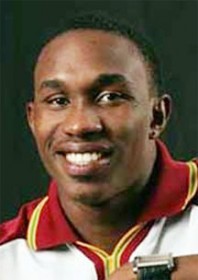
fickleness of a Caribbean people born of the frustration resulting from a lack of success gives him little time to prove his merit. If, perhaps, few expect a miraculous turn around in the team’s fortunes against an experienced, talented and ruthless Sri Lankan side, Sammy’s own performance, both as a player and as a leader, is bound to come under rigorous scrutiny. A single win or even a drawn test against Sri Lanka could significantly alter the fortunes of the St Lucian utility player. By his own admission he will be looking to his more experienced colleagues – presumably Gayle, Chanderapaul and Bravo – to help him through this period but in the final analysis it is he alone that will have to take responsibility for the outcome of the Sri Lanka tour.
We could have done without the decidedly colourful pronouncement by Chairman of Selectors Clyde Butts about Sammy having “demonstrated the attributes of a leader of this diverse group of men.” The statement appears to be contrivance in the best tradition of cricketing PR and there is always the danger that by hanging such a formidable accolade around the neck of Darren Sammy we may, in effect, be placing a noose around his neck. The truth of the matter is that while we must wish him well, none of us have the foggiest notion as to whether he is equipped or not. Sammy is a strong and determined cricketer who performs with a degree of competence in every department. He is a capable rather than an established all-rounder and we must await his performance as a player and captain in Sri Lanka before decorating him with accolades which might prove burdensome.
Nash as Vice Captain for the Sri Lanka tour is a baffling choice though it may well suggest that the white, Australian-born cricketer who broke into the Caribbean side less than a year after his October 2007 entry into the Jamaican team has fostered a greater measure of camaraderie with his native West Indian team mates than might have been suspected. What can be said for Nash is that his fighting spirit and Chanderpaul-like propensity for placing a high value on his wicket has deservedly kept him in the team in circumstances where a lesser effort would long have given rise to calls from Caribbean fans for his replacement with a home-grown player. If Nash is an experienced cricketer (next to Chanderpaul he is, at almost thirty 33, the oldest member of the squad selected to tour Sri Lanka) we know little about his leadership abilities. How he will cope if he is called upon to lead the team in Sri Lanka is a matter on which we cannot afford to think too deeply given all of the various other issues that we are compelled to contemplate.
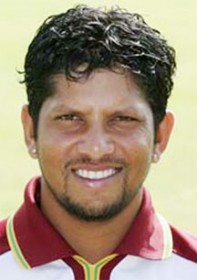
And so to Sarwan; when all the circumstances that currently attend West Indies cricket are considered, it has to be said that the exclusion of Sarwan from the tour to Sri Lanka amounts to an act of unbelievable folly; nothing excuses the decision. If the reason is linked to official comments about his current form and attitude one would have thought that the decision not to accord him a retainer contract was sufficient penalty and that his response to that decision was informed by an appropriate measure of public contriteness, suggesting that he was prepared to fight his way back into favour and that he was still committed to West Indies cricket. To exclude a player of Sarwan’s proven ability and who is still young enough not to be discarded as a casualty of the much talked-about transition is an act, which surely, the Board and the selectors ought to be required to explain to the entire Caribbean. Quite what point the selectors wish to make by leaving Sarwan out of the team for the Sri Lanka tour is hard to fathom. He, along with Gayle and Chanderpaul are the only three batsmen available to the West Indies with the proven capacity to make a real difference against a Sri Lankan team that has acquired a reputation for clinical annihilation of weaker teams. Sarwan’s exclusion also does Darren Sammy an injustice since it significantly reduces the tools with which the new captain will have to perform his own job in Sri Lanka.
There have been other surprise omissions too………like Dinesh Ramdin, the admittedly not always reliable but experienced campaigner who has turned in more than enough good performances both with the bat and behind the stumps to have warranted a place in the team. Then there is Ravi Rampaul who, surely, given his wicket-taking ability merits a starting place on the team.
The West Indies Board may be seeking to send signals that Caribbean cricket is entering a new era. The problem that we face is not so much that a host of new players have been selected to go to Sri Lanka but that few of them have had anything remotely resembling an opportunity to prove themselves against the kind of opposition that Sri Lanka will represent. No one, save and except the most enduring optimists, expect that the team will perform brilliantly against Sri Lanka. What we will find difficult to endure, however, is a situation in which, under the kind of relentless pressure which the Sri Lankans can and will exert, the less experienced players simply fold and the only returns from that tour are yet another humiliating experience and another heap of truncated careers.





